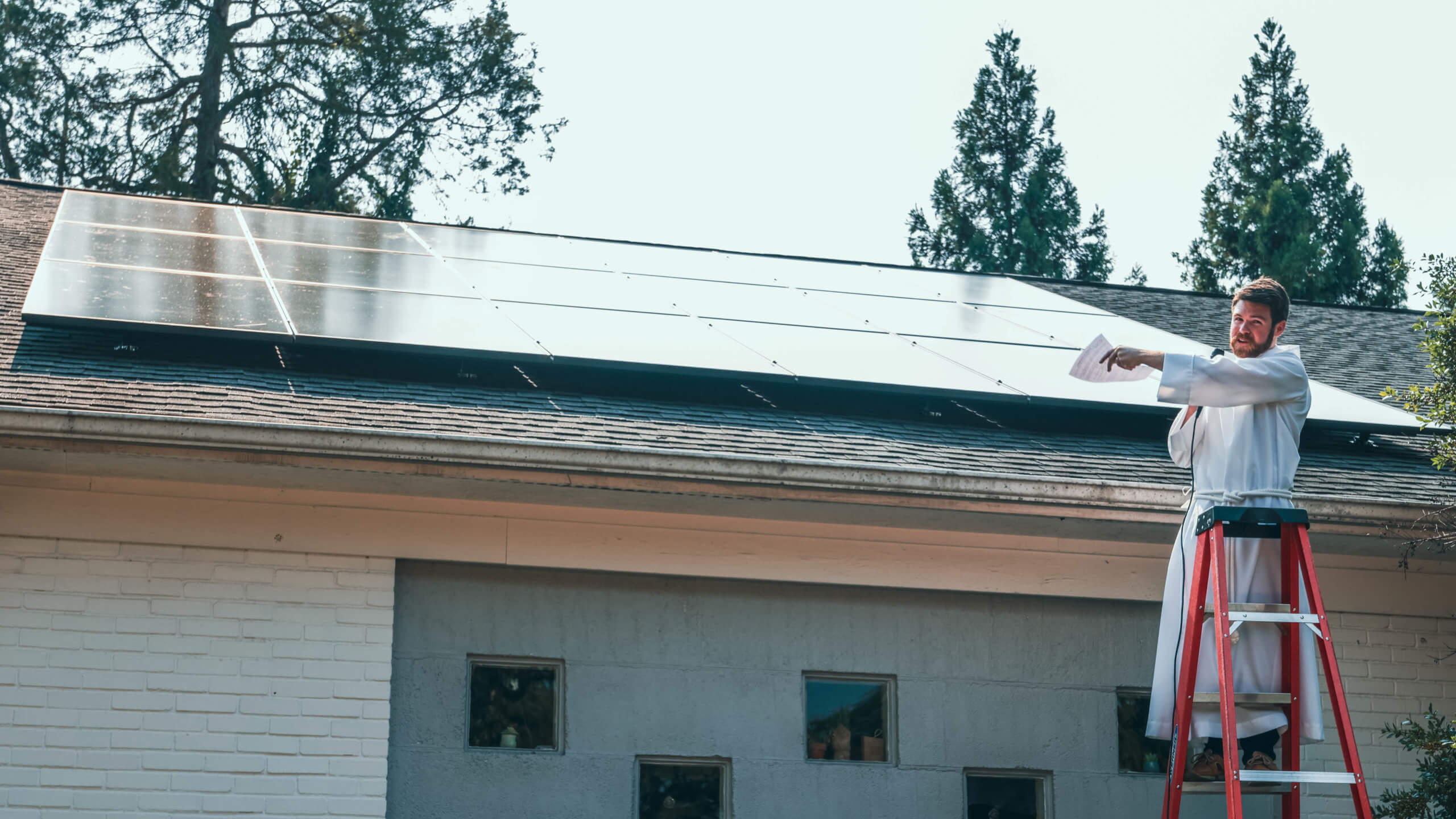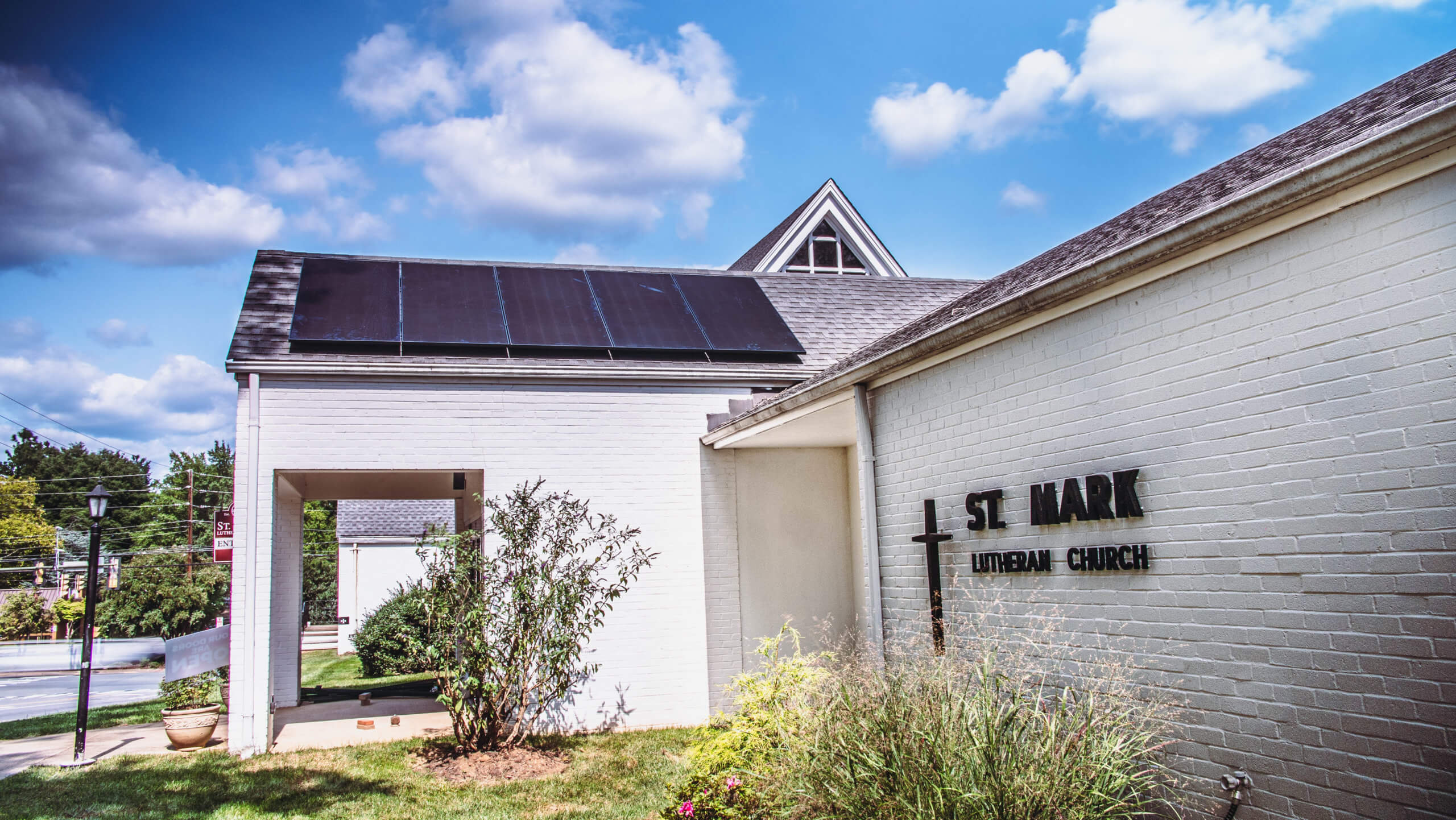Helping Nonprofits Fight Climate Change
Apex expands its solar power incentive to include community organizations.
Innovation requires first movers. At Apex Clean Energy, there is no shortage of trailblazers, and a forward-thinking culture is evident in every aspect of the company—from leading-edge emerging business lines to one-of-a-kind employee incentive programs.
Since 2016, Apex has offered sustainability incentives that encourage employees to contribute to the company mission by living low-carbon lifestyles. Apex provides financial incentives to employees who purchase electric vehicles, tools, and bikes; make their homes more energy efficient; walk, bike, or carpool to work; or add solar panels to their rooftops. And now, because of one employee’s suggestion, Apex is helping local nonprofit organizations accelerate the shift to clean energy as well.
Aligning Mission and Action
At St. Mark Lutheran Church in Charlottesville, the theme “care for creation”—the congregation’s climate initiative—permeates every discussion. It’s a mission that aligns well with Apex’s values and that resonated with New Markets Analytics Manager Chad Crowley, who found St. Mark shortly after moving to Charlottesville for his position at Apex.
Since the church’s founding, the St. Mark congregation has sought to truly live this sustainability-focused mission by taking steps such as switching to LED lighting and going paperless. In 2020, when COVID-19 ground gatherings to a halt and emptied schools, offices, and houses of worship, the church sat silent. With an unusual quiet consuming the vacant building, the congregation considered opportunities for St. Mark to further invest in its “care for creation” mission while keeping their distance.
Together, the congregation and the church leadership decided to use the property to become a clean energy generator to help fight climate change.
Beyond the tangible environmental benefits and cost savings, the solar installation will serve as a visible example for members of the congregation and the community.
“We do a great job of caring for each other, a great job worshipping, but one part is missing: taking care of creation,” said Pastor Viktoria Parvin. “When I think back to 2020, we can say that we were doing this during COVID-19. We were caring for creation and establishing something good that everyone could be a part of—without actually being here in person.”
Like many other nonprofits with limited financial resources, St. Mark typically relies on volunteers donating their time and resources. Crowley—and his expertise in clean energy—was the missing piece that St. Mark needed to embark on this new project.
Initially, Crowley considered Apex’s Solar Power Incentive Program, which gives employees a bonus for installing a qualified residential solar power generation system at their home.
“I rent an apartment downtown, so when I realized I can’t take advantage of the Solar Power Incentive Program for my own home, I asked our HR team if we could apply it to organizations in the community,” Crowley explained. “I never expected that, from that initial ask, this entire grant program would materialize.”
A few months and many planning meetings later, thanks to Crowley’s idea, Apex introduced its fifth sustainability incentive: the Solar Nonprofit Grant Program, which allows employees who are actively involved as a regular volunteer or board member with an organization to nominate the nonprofit for a grant to help cover the cost of solar system installation. Apex has pledged to award up to four solar grants per calendar year to nonprofits.

Practicing What They Preach
St. Mark became the first recipient of Apex’s Solar Nonprofit Grant Program when it energized its solar system in September 2021. The 63.7 kW installation will meet 80% of the church’s annual energy needs and will supply both the church and its preschool with clean power. Over the system’s 25-year lifespan, it is expected to mitigate the equivalent of nearly 1 million tons of carbon dioxide.
Beyond the tangible environmental benefits and cost savings, the solar installation will serve as a visible example for members of the congregation and the community, other nonprofit organizations, and, of course, the preschoolers.
“We can have firsthand, hands-on lessons for our preschoolers, teaching them about renewable energy and caring for creation. It’s incredibly valuable to expose children to these kind of values at such a young age,” said Parvin. “My hope is that our efforts with this project will be forefront for other churches and nonprofits and that more will consider going solar.”
For Apex and Crowley, that’s the goal as well.
“If each employee engages in a project, the carbon emission savings really add up,” says Crowley. “And there’s a butterfly effect: folks who may not know much about clean energy are now exposed to it, and maybe one or two of them installs small-scale solar at their home or organization. This program has a huge potential reach—both within Apex and outside.”
Today, with its 182-panel solar installation adorning the church’s A-frame rooftop, St. Mark’s mission is apparent not only to its congregation, but to the entire community—due, in no small part, to Crowley’s suggestion and Apex’s entrepreneurial spirit.

